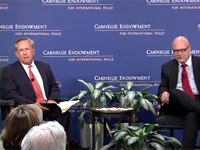Registration
Thank you!
You will receive an email confirming your registration.
In his new book, Post-Imperium: A Eurasian Story, Carnegie Moscow’s Dmitri Trenin argues that both Russian and foreign observers need to abandon the notion that a Russian empire still exists or can be re-created. He spoke with David Hoffman from the Washington Post about the fall of the Soviet Union, Putin’s expected return to the presidency, and trends in Russian society today. Carnegie’s James F. Collins introduced the speakers.
Explaining the Collapse
- Gorbachev: Mikhail Gorbachev’s glasnost’ – or openness – policy allowed for greater political transparency and popular criticism of the Soviet regime. For the first time in Soviet history, citizens started putting themselves before the state, Trenin said. This sense of personal empowerment, along with new revelations about dark episodes in Soviet history, caused people to lose faith in the system.
- Disaster Averted: Although religious and ethnic differences create potential fault lines, for the most part they did not lead to violence, Trenin added. With the end of the Soviet Union, ordinary Russians were happy to stop “shouldering the imperial burden.” Despite the case of Chechnya in Russia’s North Caucasus and other ethno-territorial conflicts, surprisingly few secessionist struggles broke out across the empire. Large Russian communities living in Kazakhstan and Ukraine, for example, did not attempt to forcibly separate and join Russia.
Russia Today
- An Atomized Society: Russian society has become increasingly self-absorbed to the point where collective action is difficult, Trenin argued. This individualism stems from a popular focus on survival during times of economic hardship, especially in the early 1990s. Although Trenin stated that such individualism has nearly run its course, he noted that Russians must be able to mobilize for the common good.
- Not a Nation: Trenin argued that in Russia “142 million people do not constitute a nation” and that over a long historical period the concept of being Russian had become “de-ethnicized” and covered other national groups.
- Elites: In Russia, Trenin explained, elites do not act as leaders. Instead, they seem to prefer to lambast the West while accumulating mass wealth. Commenting on the influence of the Russian oligarchs, Hoffman agreed, stating that “Russia is ruled by those who own it.”
- Imagined Empire: The idea the Russian Empire has not died still has currency in Russian society. Trenin argued that the rhetoric of empire serves as self-therapy for some Russians. He suggested that Russia is still struggling with the loss of empire and the prestige that accompanied its superpower status. Even Russia’s leadership has yet to grasp that its sphere of influence has shrunk.
- Russia’s “Internal Abroad”: Trenin said that the North Caucasus region is becoming increasingly de-Russified. Today, few Russians remain in places such as Dagestan, Ingushetia, and especially Chechnya, which used to have a large Russian population (around 400,000). Although Chechnya may be part of Russia on paper, Trenin admitted that it is basically a de facto state. Russia wields influence in Abkhazia and South Ossetia – both located in the South Caucasus – but it is losing control over its own state territory in the North Caucasus.
Putin’s Return
- Implications for Russia and the United States: Another Putin administration will preserve the status quo in Russia for at least a few more years, Trenin said. However, even Putin realizes that the economic hardships are on the horizon may require serious austerity measures. Turning to Moscow’s relations with Washington, Trenin noted that Putin’s return may change the nature of the U.S.-Russia relationship, but at least U.S. officials will be dealing directly with Russia’s primary decision-maker.
- Putin’s Strengths: Trenin argued that Putin has two important strengths that reinforce his political power. First, Putin is able to obtain the acquiescence – not just the support – of a substantial number of Russian voters. Second, Putin can bring powerful oligarchs to the table. No other political leader in Russia wields this kind of influence.
- Medvedev’s Role: Although President Medvedev has less popular support than Prime Minister Putin, he is able to exert influence in ways unfamiliar to Putin. As Trenin pointed out, Medvedev goes where Putin cannot – to Russia’s young, internet-savvy generation and to the West. Trenin found the announcement that Medvedev would become the next prime minster and the head of United Russia surprising, but he suggested that these positions would be restructured to fit Medvedev.
